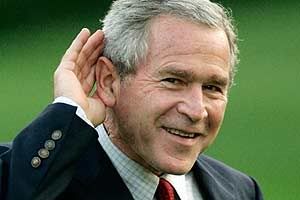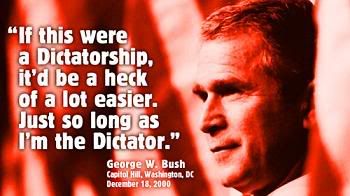
Most folks when asked to define the Bush Doctrine, other than stealing elections, would point to a document called the National Security Strategy of the United States published in September 2002, which states among other things:
To forestall or prevent such hostile acts by our adversaries, the United States will, if necessary, act preemptively in exercising our inherent right of self-defense.
Preemptive war. The idea if the United States perceives a threat outside of our borders, even a 1% chance of danger against American interests, then the U.S. has the right to “defend” itself preemptively.
But I would argue historians will define the Bush Doctrine as something else. Something much more dangerous, reckless and un-American. The Unitary Executive.

The architects of the Unitary Executive are Dick Cheney and David Addington. They chafed at the bit of Constitutional balance of power for a generation before 911 gave them the opening they prayed for: a wet-dream of dictatorial power.
The quest to give the Office of the President dictatorial powers goes back to the days of Nixon, but gelled during the reign of Ronald Reagan.
The foundation principle of the Unitary Executive is this: as regards the conduct of foreign policy, the Congress of the United States is nothing but a rubber stamp approval of anything the President decides.
Cheney and Addington were gobsmacked during the 80s when the Congress had the audacity to check Presidential power’s conduct of a secret war in Central America.
Indeed during the Congressional investigation of Iran-Contra Cheney had Addington write the minority report for the committee. To quote from Jane Mayer’s brilliant book, The Dark Side:
In late 1986, he (Cheney) became the ranking Republican on a House select committee that was investigating the scandal, and he commissioned a report on Reagan’s support of the Contras.
Addington, who had become an expert in intelligence law, contributed research. The scholarly sounding but politically outlandish Minority Report, released in 1987, argued that Congress – not the President – had overstepped its authority by encroaching on the President’s foreign-policy powers.
The President, the report said, had been driven by “a legitimate frustration with abuses of power and irresolution by the legislative branch.” The Minority Report sanctioned the President’s actions to a surprising degree, considering the number of criminal charges that resulted from the scandal. The report also defended the legality of ignoring congressional intelligence oversight, arguing that “the President has Constitutional and statutory authority to withhold notifying congress of covert actions under rare conditions.”
And it condemned “legislative hostage taking” noting that “Congress must realize… that the power of the purse does not make it supreme” in matters of war.
The Dark Side, by Jane Mayer, pg. 60
So what we really have here is the founding document for the Unitary Executive. Congress was actually fulfilling its Constitutional duty to oversight and this was considered an abuse of power. And they were nothing if not absolutely resolute in the matter.
The neo-conservatives believe in the case of foreign policy the President is King. However the Constitution gives the Presidency only one ‘foreign policy’ power of Commander-in-Chief, after presumably the Congress declares and funds the war effort. The President may enter into foreign treaties only with the Advice and Consent of the Senate.
Presidential power is actually quite limited Constitutionally; though time, tradition and Congressional malaise has given the President more power than given by the framers. Indeed, the Executive and the Legislative are full partners in the conduct of foreign policy.
One man is not given the power to declare and wage war dissent be damned. And yet that is exactly what is contemplated in the Bush Doctrine of the Unitary Executive.
Fundamentally, the drive for expanded Presidential authority was about power. Cheney and Addington “viewed power as the absence of restraint, which is why they didn’t go to Congress,” Jack Goldsmith, a conservative legal scholar and former Justice official explained.
In the days after 911, they spoke often of wanting “maximum flexibility.” What was lost in this view, however, was any appreciation for the legitimacy in a democracy that stems from winning consensus, including the consent of the governed. Also overlooked was the original reason for checks and balances; they were designed to offset human fallibility.
Ibid, pg. 61
The Bush Doctrine is the President is the sole authority in matters of foreign policy. This doctrine is blatantly un-Constitutional and by extension un-American.
And since 911 we’ve had an un-checked Executive waging rubber-stamped aggression, fighting an undeclared war without end, spying on its citizens, unilaterally abrogating historical treaties like the Geneva Conventions, embracing torture of perceived enemies, most of which were completely innocent people and ignoring the rule of law through the use of signing statements and either lying or withholding information from the oversight and accountability authority given to the Congress by the Constitution of the United States of America. It must be said that certain Congressional leaders were briefed on some of these practices and either agreed with them or were bound by security considerations not to divulge them.
When Bush declared proudly he was “the decider” he was not practicing vainglory, but the Bush Doctrine.
If there is one meme I would like to see destroyed it is that “we are a nation at war.” We are not at war, we are at aggression. The Congress gave authority for military endeavor to the President in a time of great commotion, confusion and a concerted effort by the Executive PR machine to promote jingoist patriotism and the imminent threat of nuclear or WMD attack by “the enemy.” Many politicians who voted for that military authorization have since changed their mind and/or regretted the vote, based as it was on deceit and hyperbole.
It is time to explain who the enemy is and the enemy can’t be an idea like Islamo-fascism. The enemy can’t be a word like “terror.” It’s time we stop the charade and the bumper-sticker slogans and restore the rule of law and the supremacy of the Constitution over the flawed and dangerous ideas of flawed and dangerous men.
The Constitutional American Republic is built upon a balance of power between three branches of government. No one branch has unequal authority in any policy arena.
It is time to figuratively kill the King (even if his name is Obama) and long live the Republic.



